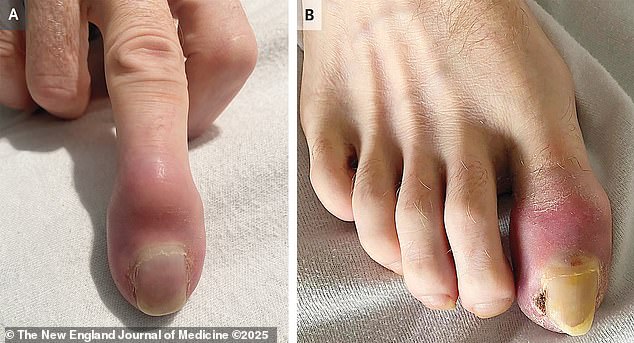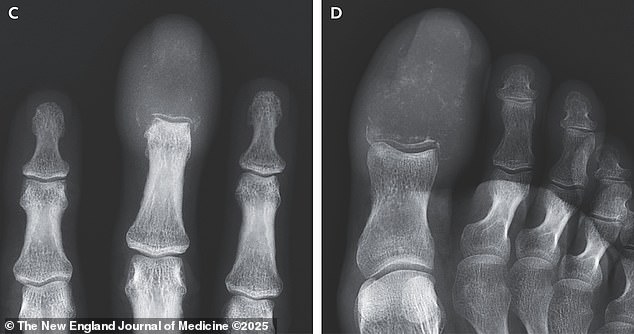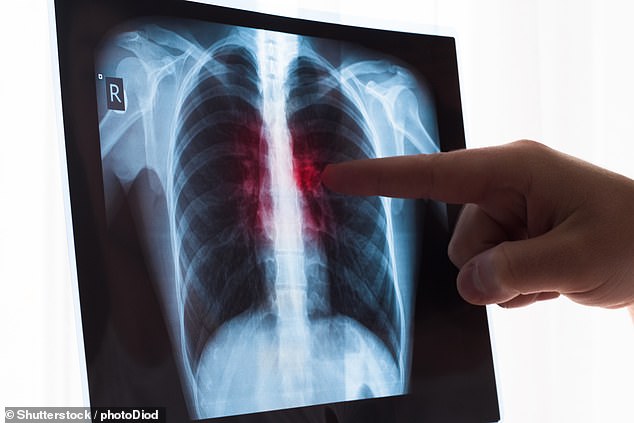A man suffering from an aggressive form of lung cancer experienced an extremely rare complication of the disease – with one of his fingers and toes swelling unexplainably.
It turns out, the bones in his digits had been ‘completely replaced’ by cancerous tumors as the cancer spread throughout his body.
The 55-year-old from Australia had been diagnosed with metastatic squamous-cell lung cancer, an advanced form of the disease that starts in the flat, thin cells lining the airways. It is a type of non-small cell lung cancer (NSCLC), making up about 25 percent of all lung cancer cases – approximately 58,000.
He went to his local hospital six weeks after he noticed painful swelling in his right middle finger and right big toe, giving them a club-like shape.
Doctors, who recounted the man’s case in a medical journal, found that each tip of the affected digits were red, swollen and sensitive to touch.
An ulcer – an open sore or raw area – had formed near the nail of the toe, turning it bright yellow.
Scans showed that the hand and foot contained ‘destructive lytic lesions,’ areas of the bone where tissue had been destroyed.
In the man’s case, the empty space has been ‘completely replaced’ by more tumors.
Using a form of x-ray called a radiograph, doctors diagnosed the man with acrometastasis, a rare instance in which cancer spreads to bones below the elbow or knee like the hands or feet.

The above shows the man’s finger (left) and his toe (right)

The above shows X-rays of the man’s finger (left) and toe (right)
Acrometastases only account for about 0.1 percent of cancer cases that have spread to the bones, recent studies suggest.
In most cases, like the man’s, it’s seen in patients who already have cancer.
But in some instances, symptoms of acrometastasis are the first signs of undiagnosed cancers, such as those in the lung, gastrointestinal tract, genital and urinary tract.
It’s also much more common in men than women, a 2021 review suggests, largely because lung cancer is more prevalent in men.
In many cases, cancer that has spread to the fingers and toes reacts like gout or osteomyelitis – a bone infection – which cause inflammation, redness and swelling.
It’s thought that acrometastases are so rare because, in most cases, cancer cells are drawn to bone marrow, which is found in the long bones of the arms, legs, ribs, backbone, breastbone and pelvis. Finger and toe bones, by contrast, contain much less marrow.

The unnamed man suffered from an aggressive form of lung cancer, doctors said (stock image)
Additionally, the further a bone is from the heart, the less blood it gets. Lower blood flow makes it harder for cancer cells to reach the fingertips or toes, so acrometastases happen there far less often.
Acrometastases have a grim prognosis because they are generally found in advanced cancer cases. They have been associated with less than six months of survival time after diagnosis.
Patients are typically given medications to manage their pain rather than cure the disease.
In the man’s case, doctors started with palliative radiotherapy, which focuses on pain relief from cancer that has spread to the bone.
He died three weeks later from refractory hypercalcemia, dangerously high calcium levels in the blood that don’t respond to treatment, a common complication in cancer patients.











